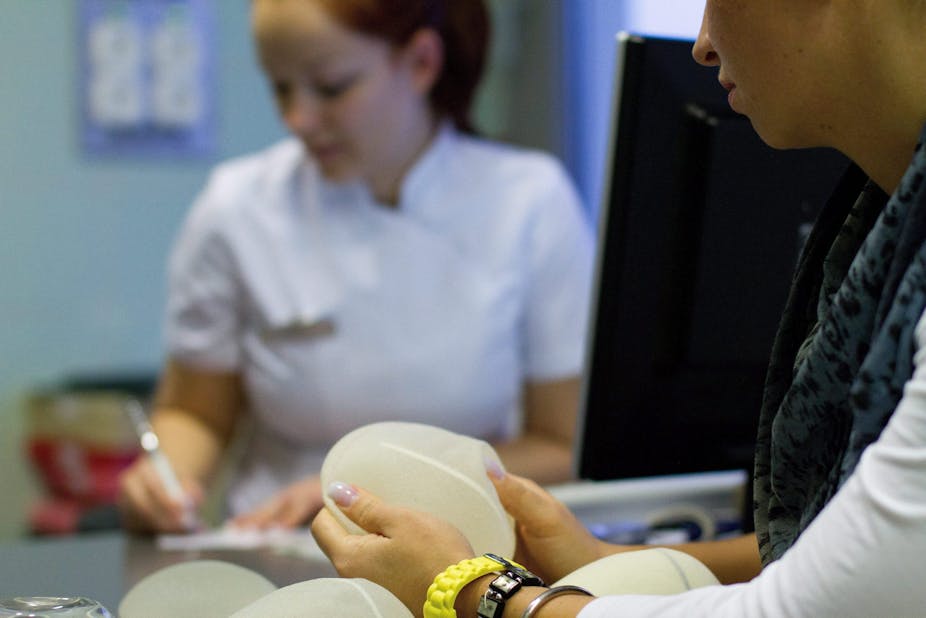The Medical Board of Australia has just released draft supplementary guidelines for cosmetic, medical and surgical procedures. Overall, they’re condescending towards recipients of cosmetic surgery and take aim at the wrong target – it’s the purveyors of these services rather than consumers who need to be regulated.
Most Australians have a friend or a family member who’s had a procedure that could be classified as cosmetic surgery. Members of my own family have had Botox injections and breast reductions. I have close friends who’ve had blepharoplasties (eyelid modifications) and liposuction and have, myself, had laser treatment to remove a burst vein on my cheek.
Cosmetic surgery is ubiquitous and increasingly acceptable but it still makes many people wary. This is particularly the case when we hear of the very young seeking it out. Such cultural unease is the result of the grey area that cosmetic surgery occupies, sitting as it does at the strange nexus of beauty treatment, medical procedure and consumer item.
So it’s timely for the Medical Board of Australia (MBA) to be thinking about regulating cosmetic surgery. But the draft guidelines it’s offering will be about as helpful for dealing with cosmetic surgery as a band-aid on a gangrenous leg.
The consultation paper contradicts itself, firstly by categorising cosmetic surgeries as “medical and surgical procedures … achieving what the patient perceives to be a more desirable appearance or boosting the patient’s self- esteem.” And then advising that if “there are indications that the person has self-esteem or mental health problems, the person should be referred to a GP or an appropriately qualified health professional.”
So cosmetic surgery is all about boosting self-esteem but surgeons need to watch out for patients with self-esteem problems? That’s like telling an oncologist to watch out for people with cancer. What’s worse, the very doctors who stand to gain financially from performing the surgeries will be responsible for checking these self-esteem issues.

Regardless of this contradiction, the issue of mental health is very problematic when it comes to cosmetic surgery. Ten years ago, when I embarked on a project to interview people about their reasons for cosmetic surgery, the ethics committee at my university insisted that I give each interviewee a list of psychologists they could visit. The insulting assumption was that these (mostly) women must be unhinged because they wanted cosmetic surgery.
The ridiculousness of the situation hit me hardest when I apologetically handed the said sheet of contacts to a partner in a huge city law firm. The sun glinted off the harbour behind her in her corner office as she dropped it straight into her wastepaper basket.
Nobody questions the mental health of someone wanting a knee reconstruction. Equally, they don’t question the mental health of someone wanting a severe scar minimised. But wanting larger breasts, smoother skin or less droopy eyelids makes us cringe and demand the person asking for the operation be assessed for mental stability and for self-esteem issues.
This approach may, in part, result from our tendency to forget that cosmetic surgery is no longer simply a medical procedure that the medical profession has control over. Patients do their own research, learning about what’s possible from the internet, reality television, and word of mouth. They assess their looks based on movie stars and television personalities.
Crucially, they seek out surgeons not as experts but as technicians. If one won’t do what he’s asked (the vast majority of cosmetic surgeons are men), they find another. And if they can’t afford what they want in Australia, they go to Thailand or Malaysia.
People have come to see cosmetic surgery as a right, a consumable, or something anyone can have if they can pay for it. The practice has moved way beyond being an issue about self-esteem and mental health. For many, it’s simply part of good grooming or fashion – just another aspect of everyday life.
It’s not these information-armed patients who need regulating and assessing in this industry, it’s the doctors, who are making large amounts of money and have already built mini-empires. In order to make a real change to the cultures of cosmetic surgery, we need to legislate that only plastic surgeons (who are genuine registered specialists with many years of training) be permitted to perform cosmetic surgery.
Right now, “cosmetic surgeons” may be plastic surgeons, but are more likely to be general practitioners or others who have undergone some basic training. This training sometimes amounts to as little as a weekend workshop or, worse, watching an instructional DVD. These are the people who will be responsible for referring patients to GPs or psychiatrists if they appear to have “self-esteem” or mental health issues. And what qualifications do they have to diagnose mental health issues? Perhaps they could attend a weekend workshop or watch a DVD for that as well.

